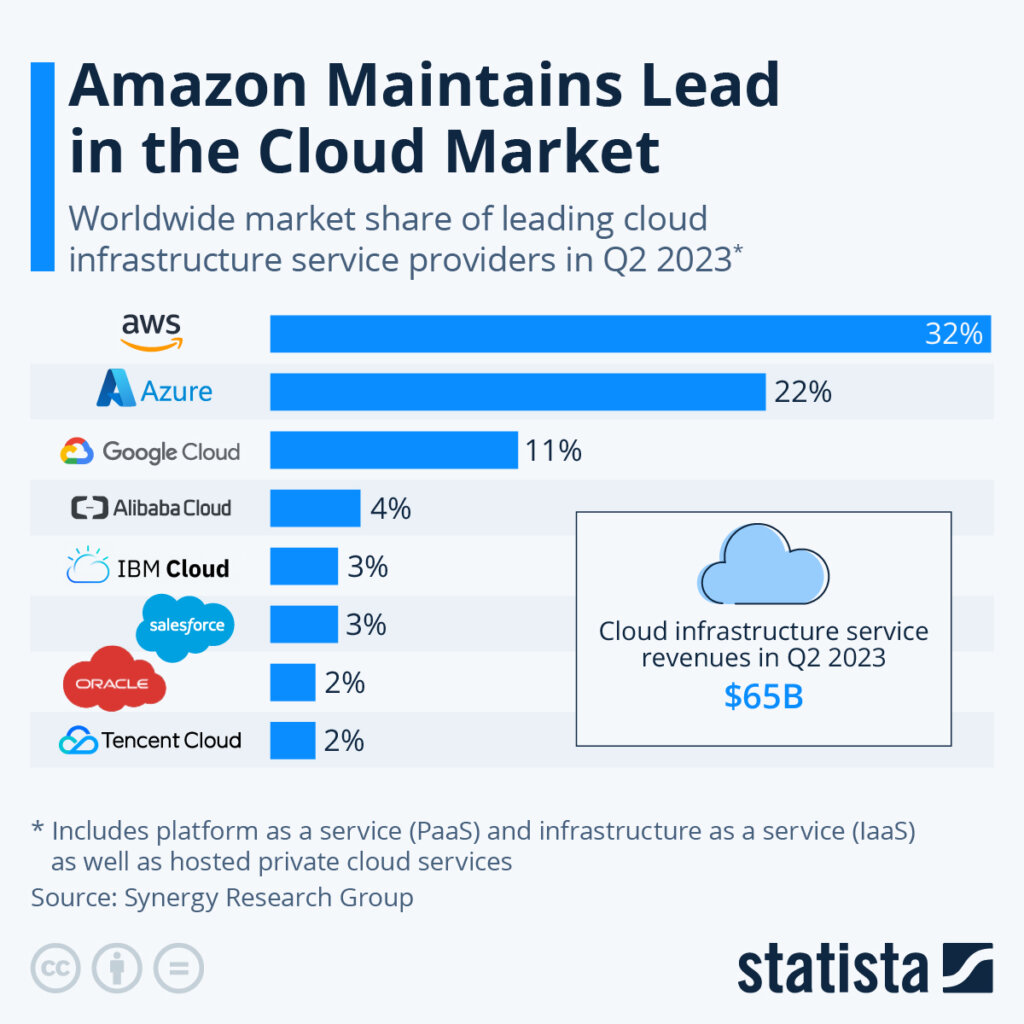
Google Cloud is making it easier for customers to switch to their competitors (Image by Shutterstock).
Google Cloud customers can switch service providers for free
- Google Cloud is making it easier for customers to switch to its competitors.
- Customers who wish to switch cloud service providers will not have to pay to transfer clouds.
- Google Cloud has around 11% cloud market share as of Q2, 2023.
Google Cloud, AWS, Microsoft Azure, IBM Cloud, and Alibaba Cloud are just some of the major cloud providers that businesses rely on heavily today. As businesses continue to invest in more technologies to improve their productivity and efficiency, the cloud will be a key component in their decisions. Be it using more AI applications or getting more insights from data, the cloud will continue to play an important role for businesses in all industries.
According to a report by Gartner, worldwide end-user spending on public cloud services is forecast to grow 20.4% to a total of US$678.8 billion in 2024, up from US$563.6 billion in 2023. The report also states that all segments of the cloud market are expected to see growth in 2024. Infrastructure-as-a-service (IaaS) is forecast to experience the highest end-user spending growth in 2024 at 26.6%, followed by platform-as-a-service (PaaS) at 21.5%.
Another key trend driving cloud spending is the continued rise of industry cloud platforms. Industry cloud platforms address industry-relevant business outcomes by combining underlying software-as-a-service (SaaS), PaaS and IaaS services into a whole-product offering with composable capabilities. By 2027, Gartner predicts that more than 70% of enterprises will use industry cloud platforms to accelerate their business initiatives, up from less than 15% in 2023.

Google Cloud is hoping to gain more cloud market share. (Source – Statista).
The booming cloud market
Cloud service providers are also hoping to make the most of the demand by offering the best products and services to their customers. According to a report by Statista, in Q2 2023, AWS holds the largest market share in the cloud market, at 32%. This is followed by Azure at 22% and Google Cloud at 11%. China’s Alibaba Cloud commands 4% of the global market while IBM Cloud and Salesforce have a 3% market share each. Oracle and Tencent Cloud also both have a 2% market share.
Despite dominating the market, AWS is aware of the demands of customers and continues to improve its pricing. This includes launching a Cost Optimization Hub so that businesses will be able to manage their cloud costs better. But even so, cloud costs have been skyrocketing, especially with the demand for more AI workloads across the business world.
Two of the biggest challenges businesses face when it comes to using the cloud are the increasing cost of managing their cloud and having the right talent to work for them. Often, the high costs of data migration can be a deciding factor in whether or not a business decides to work with a particular cloud provider.
While there are managed service providers that can help businesses with these issues, the reality is that businesses want the flexibility and ability to move their data or even switch cloud providers at the end of their contracts.
But here’s the thing. Cloud providers want to ensure their customers remain with them, and they do this in two ways. The first is by giving the best service to their customers and ensuring the costs are manageable. The second is by making the costs of moving to another cloud service provider extremely high so that the customer will have no choice but to remain with them if they want to avoid paying high data transfer fees.
Now, Google Cloud is hoping to disrupt this practice.

Is Google Cloud disrupting the cloud market? (Image by Shutterstock).
Google Cloud makes it cheaper to switch cloud providers
“Starting today, Google Cloud customers who wish to stop using Google Cloud and migrate their data to another cloud provider and/or on-premises can take advantage of free network data transfer to migrate their data out of Google Cloud. This applies to all customers globally,” said Amit Zavery, GM/VP, head of platform at Google Cloud.
Google Cloud is making it easier for customers to switch to their competitors. But why is Google Cloud doing that? Well, it could be because Google Cloud is extremely confident in its products and services and feels that customers are already getting the best they can in the industry. it probably isn’t that, but it could be. Google, after all, has never been shy of trumpeting its own superiority in any market in which it’s invested.
True enough, AWS is known for being relatively more affordable. And other cloud providers make it nearly impossible for customers to even consider switching due to their ridiculous data transfer costs.
Zavery points out that certain legacy providers use their on-premises software monopolies to create cloud monopolies, using restrictive licensing practices that lock in customers and warp competition. He added that this complex web of licensing restrictions includes picking and choosing who their customers can work with and how; charging 5x the cost if customers decide to use certain competitors’ clouds; and limiting interoperability of must-have software with competitors’ cloud infrastructure.
“These and other restrictions have no technical basis and may impose a 300% cost increase on customers. In contrast, the cost for customers to migrate data out of a cloud provider is minimal,” said Zavery.
As such, Google Cloud wants to make it easier for customers to move from one provider to another as it does little to improve choice if customers remain locked in with restrictive licenses. Zavery believes that customers should choose a cloud provider because it makes sense for their business, not because their legacy provider has locked them in with overly restrictive contracting terms or punitive licensing practices.
“The promise of the cloud is to allow businesses and governments to seamlessly scale their technology use. Today’s announcement builds on the multiple measures in recent months to provide more value and improve data transfer for large and small organizations running workloads on Google Cloud,” he concluded.
It is also important to note that there are certain terms and conditions to this. Businesses who wish to move away from Google Cloud can start by contacting their Google Cloud Support team.
The Google Cloud Support team will review the request and notify the customer of when they may initiate the migration of all its workloads and data from Google Cloud to another cloud service provider or an on-premises data center for free in anticipation of terminating their Google Cloud agreement. The customer will then have 60 days following this notification to complete their migration out of Google Cloud.
READ MORE
- Data Strategies That Dictate Legacy Overhaul Methods for Established Banks
- Securing Data: A Guide to Navigating Australian Privacy Regulations
- Ethical Threads: Transforming Fashion with Trust and Transparency
- Top 5 Drivers Shaping IT Budgets This Financial Year
- Beyond Connectivity: How Wireless Site Surveys Enhance Tomorrow’s Business Network




